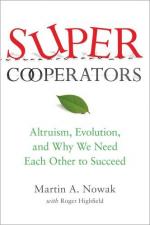|
This section contains 759 words (approx. 3 pages at 300 words per page) |

|
Altruism refers to behavior that benefits other animals of the same species. Living in the company of other animals presents numerous drawbacks, such as increased competition for food, nest sites, and mates, and increased visibility to predators. Yet many animals are observed to act in ways that help one another: a ground squirrel, spotting a hunting hawk, stands tall and gives a shrill alarm call, potentially drawing the hawk's attention to itself; a lioness allows cubs that are not her own to suckle alongside her cubs; a honeybee comes to the defense of its hive by stinging an encroacher, an act which proves fatal to the bee. Such self-sacrificing acts of altruism require an explanation, because they seem to contradict what is expected in a world shaped by natural selection
Biologists recognize altruism when an animal sustains some cost to its present or future reproduction by aiding another...
|
This section contains 759 words (approx. 3 pages at 300 words per page) |

|


